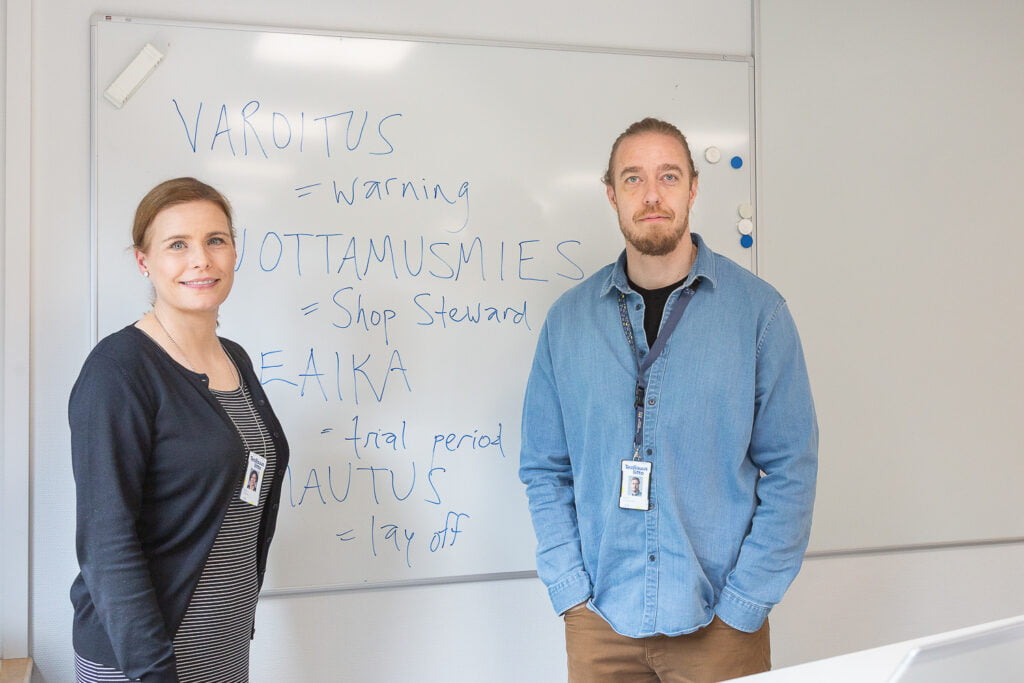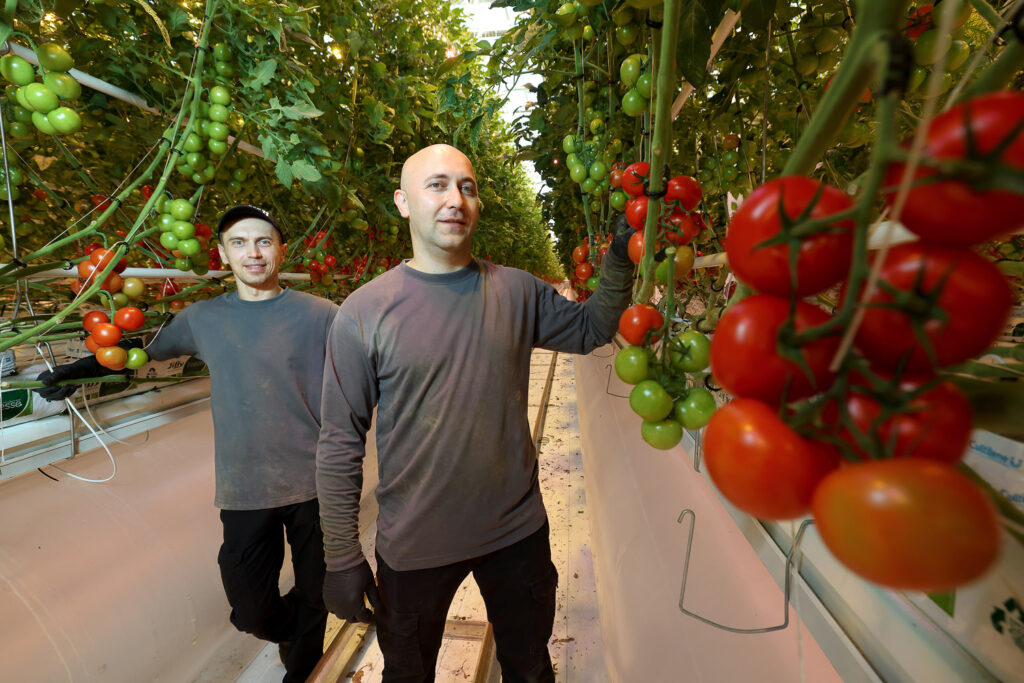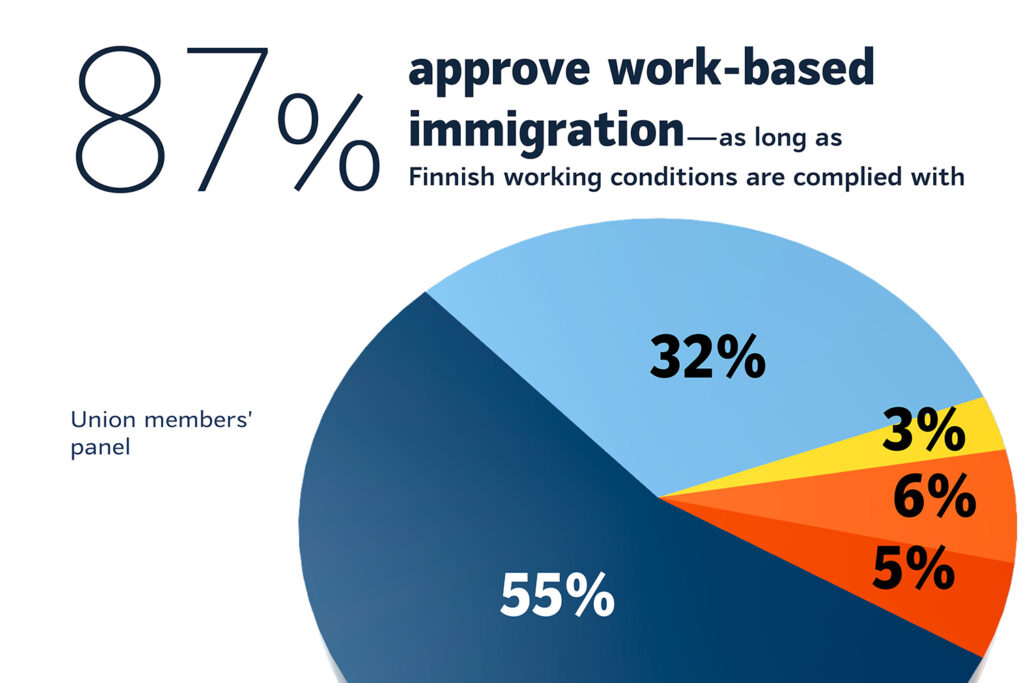“This training was an eye-opener” – Learning the rules of Finnish working life
A pilot training on the rules of working life in English, organised by the Industrial Union in Murikka-opisto, gathered 19 active participants to delve into the ins and outs of Finnish working life through discussion.
Debra Haroon, Olusola Adekoya and Marius-Ovidiu Bucur were among those who participated in “The rules of working life in English”, a course organised by the Industrial Union in Murikka-opisto on 1–3 June.
“I can see myself working as a shop steward in the future”, Haroon says.
”This training was an eye-opener. Anything is possible”, Adekoya says.
Organised for the first time, the course had 19 participants from various sectors of the Industrial Union. Although the participants’ origins were from across the globe, what they had in common was their desire to learn more about the rules of Finnish working life.
“This training gave us a suitcase full of tools for the future”, says Haroon.
”The course was well organised and also entertaining”, Bucur agrees.
The course consisted of, among other things, basic information on employment contracts, collective agreements and Finnish labour legislation.
“I can now see that I, too, have done things wrong because I have not been aware of things”, Bucur says.

TAPPING INTO TALENT
Haroon, who moved from Pakistan to Finland in 2014, is a teacher by profession but has not been able to find a permanent job in her own field. She is currently working in textile care at Lindström Oy in Turku.
“Language can become a barrier to finding a job”, Haroon says, hoping that employers would not waste talent because of language issues.
While people in Finland are generally friendly, Haroon has also experienced racism. After working for years without any union or unemployment fund membership, she joined the Industrial Union when her employer mentioned it.
In Finland, everyday errands and tasks can be easily handled in English, but special terminology and the legislation can be difficult.
“My supervisor starts talking in Finnish but continues in English if it seems like I don’t understand”, Bucur gives an example.
The union helps you, but you have to take responsibility for what you do.
Bucur moved to Finland from Romania five years ago and is now working as a mechanic at Steelcomp Vaasa Oy.
At first, he was a member of the General Unemployment Fund YTK, thinking that the YTK was also a trade union. After a problem at the workplace, he realised how things really were and joined the Industrial Union.
“The union helps you, but you have to take responsibility for what you do”, Bucur says.
Bucur thinks that in Finland, the balance between businesses and trade unions works well, whereas in Romania, the labour market system is still a work in progress.
HOPING FOR MORE TRAINING
Adekoya moved to Finland from Nigeria 14 years ago. He is currently working at the Uusikaupunki car factory of Valmet Automotive Oy.
“I joined the union when I started at Valmet. Someone advised that it’s a good idea to be a member, because then you get security”, Adekoya says.
“When you are a member, you know that you are supported. The union cannot, however, change a wrong into a right. You have to be a good guy at work”, Adekoya continues.
While Adekoya has enjoyed working at the car factory, he would like the work community to offer more opportunities for social interaction. That way, information would also spread more effectively in the community.
The trio we interviewed contemplated the possibility that in the future, English courses could be aimed at all union members. In this pilot training, all participants were of foreign background.
“It would be great to have integrated programmes where Finnish people and foreigners could learn together,” Haroon says.
“Thank you to the union for this training. We want more of this”, Adekoya says.

GENERAL INFORMATION AND DISCUSSION
The English language course was held by Bargaining Specialists Riikka Vasama and Martti Paavilainen from the Industrial Union.
“We, Murikka-opisto and our Educational Services have identified a need for foreign-language training”, Vasama says.
The pilot course was based on an introductory course for shop stewards.
“We went over general information about working as a shop steward and how people can participate in the union’s activities”, Vasama says.
The instructors were delighted by the large number of participants and their active contribution.
“We had a lot of discussions on employment contracts, collective agreements, Finnish legislation and how they are related”, Paavilainen says.
We went over general information about working as a shop steward and how people can participate in the union’s activities.
The participants had many specific questions. It was not easy to give simple, clear-cut answers because the law and agreements do not always have exhaustive explanations for everything. As a last resort, solutions can be sought from the court.
“Hopefully, we were able to send a message that sometimes there is no one right answer to a situation or problem”, Vasama says.
RIGHT TO TRAINING
The course was marketed directly by email to union members who had stated that their language was other than Finnish or Swedish. This meant 3,500 members in total.
“It was news to them that they are entitled to receive training at the union’s expense in Murikka-opisto”, Vasama says.
The participants gave both criticism and praise to their shop stewards. Without a common language, it can be difficult to advocate or promote things, but much also depends on attitudes.
“We must be able to support shop stewards who work in companies that have immigrants”, Paavilainen says.
The Industrial Union trainings are available in the Union’s electronic course system Telmo at teollisuusliitto.etapahtuma.fi/kurssikalenteri




